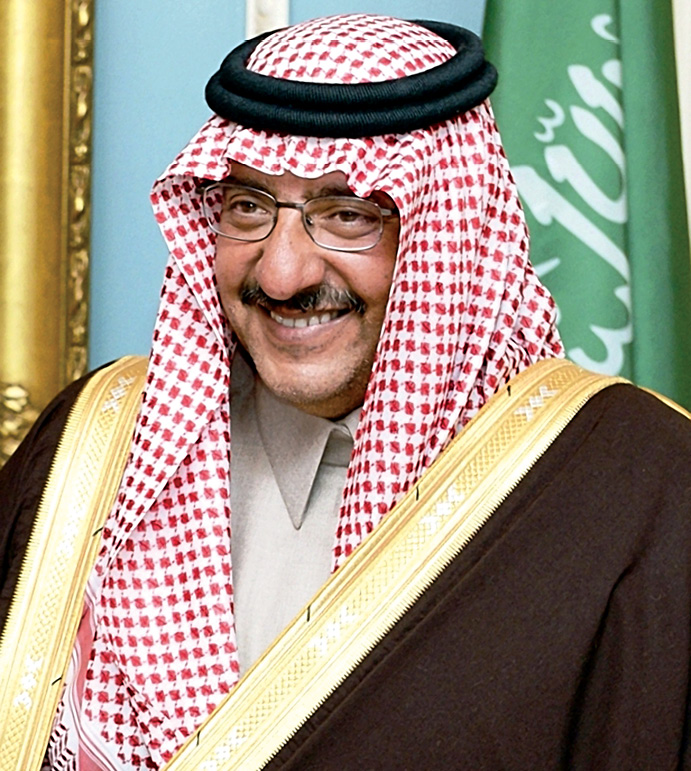 In April, the rising star in the House of Saud, Mohammed bin Naif bin Abdulaziz Al Saud (55) was named first in line for the succession by King Salman bin Abdul Aziz al-Saud last April after barely three months as deputy crown prince.
In April, the rising star in the House of Saud, Mohammed bin Naif bin Abdulaziz Al Saud (55) was named first in line for the succession by King Salman bin Abdul Aziz al-Saud last April after barely three months as deputy crown prince.
Energetic, low-key, pragmatic, efficient, hard-working, Prince Mohammed bin Naif is the first of his generation slated to lead the House of Saud now that the succession has reached the grandsons of King Abdulaziz (Ibn Saud) who in the early 1900s brought his family back to power by reconquering Riyadh and ultimately united his vast dominions into the Kingdom of Saudi Arabia in 1932.
Prince Mohammed bin Naif remains at the helm of the Ministry of the Interior, which he has led since 2012 and from where he guides coordinates the kingdom’s counterterrorism efforts. He also commands the kingdom’s 200,000-strong security forces. The prince gained wide recognition as the architect of the campaign that dismantled the al-Qaeda network in the kingdom. Considered the most pro-US minister in the Saudi cabinet, the crown prince rarely gets directly involved in foreign policy issues deferring these matters to the king.
He does, on occasion, voice his support for US president Barack Obama as when he publically opposed the release of photos depicting the interrogation of suspected terrorists. In his role as minister of the interior, Prince Mohammed bin Naif is in constant contact with Western intelligence agencies who praise him lavishly for his effective management of security-related matters.
In late 2010, he supplied intelligence to his American counterparts that thwarted the cargo bomb plot by which the local al-Qaeda affiliate had meant to explode two cargo planes in mid-air over US cities. In 2009, the same al-Qaeda cell plotted to assassinate the prince – one of four attempts on his life. He survived the 2009 suicide attack with only minor injuries.
Iron Fist
The prince insists, however, that terrorism is first and foremost a criminal matter, rather than a political one, and as such requires forceful policing methods instead of an all-out military response. Prince Mohammed bin Naif is also the kingdom’s first deputy prime-minister.
While adopting an iron fist approach to political and religious-inspired fanaticism, Prince Mohammed bin Naif is happy to engage in dialogue and actively explains his policy initiatives to the media. He is easily the most talkative member of the Saudi Royal Family and as such signals the coming of a new era in which the kingdom’s rulers place greater emphasis on openness and proximity to the wider society.
King Salman has subtly indicated that he would like to see the country now prepare to transition into its fourth political phase. During a meeting on June 3 at the Al-Salam Royal Palace in Jeddah with officials in charge of the fight against corruption, the king is reported to have dwelled on Saudi Arabia’s three political eras starting with Mohammed bin Saud in 1744 and moving via Turki ibn Abdullah in 1824 to the present and the reign of Salman.
The history lesson is widely considered the preamble to a future rearrangement of the ruling establishment. Crown Prince Mohammed bin Naif is to be awarded the leading role in this grand exercise in statecraft.
Damage Undone
Upon his accession, King Salman moved lightning fast to secure his succession and undo the damage done by the former head of the royal court Khaled al-Tuwaijri whose rather secretive ways had placed the royal family under great strain. Firmly in control of the king’s agenda and aiming to rule by dividing the ranks of possible contenders, Al-Tuwaijri had kept the around two hundred princes in government positions far apart, sowing confusion and mistrust as he prevented meetings and discouraged even informal contacts between them. He also was perceived to be hostile to Sunni political movements counterbalancing their influence by bestowing favours on Shiite organisations, allowing them enough leeway to operate under the radar in vast areas.
King Salman’s decision to launch Operation Decisive Storm against the Houthi militias operating in neighbouring Yemen was indirectly – but intimately – related to the need to push back Shiite influences on the Arabian Peninsula. As chair of the newly-created Council for Political and Security Affairs, Prince Mohammed bin Naif is one of the leading commanders of the military intervention.
The prince is the son of Naif bin Abdulaziz who preceded him at the Ministry of the Interior and died in 2012 as one of two crown princes outlived by the late King Abdullah. Declaring his nephew first in line for his succession, King Salman has settled the complicated transition from first to second generation leadership within the 25,000-strong royal family.
The decision bypassed a number of princes with possibly better claims to the throne such as the late King Abdullah’s son, Prince Mutaib. It is the first time that power will pass beyond the control of the 45 sons (36 of whom survived into adulthood to have children of their own) fathered by the late King Abdulaziz ibn Saud (1876-1953).
Royal Succession

Questions about how power was to pass from one generation to the next had kept the entire nation enthralled for years on end. Saudi law states only that power is to pass to the “most upright” of the sons and grandsons of the kingdom’s founder.
The current horizontal succession model is difficult to manage as many hundreds of royals may lay claim to the throne. Hereditary succession whereby the first-born sons assumes power upon the passing away of the king may appear more straightforward but would limit governance to one wing of the family.
According to Saudi Arabia watcher Stephane Lacroix, the hereditary system carries the seed of division within: “It would exclude large parts of the extended royal family from ever ascending to the throne. That would cause tension and quite possibly instability in the short run but would in all likelihood increase the monarchy’s stability in the medium term.”
By contrast, the horizontal model of royal succession guarantees the rights and safeguards the interests of everyone concerned and thus unites the entire family while causing a moderate degree of confusion as family branches jockey for position in a real life – albeit less violent and explicit – version of Game of Thrones.
With the sudden elevation of his Prince Mohammed bin Naif – the matter is now settled and the family united – the aging king also wished to send a clear message to Washington that the kingdom will remain a dependable friend and willing ally in the global fight against terrorism. The crown prince is reputedly the hardest working member of the Saudi cabinet often pulling all-nighters at the Ministry of the Interior. Asked why he insists on staying at his post well into the wee hours, he is reported to have answered: “Because that is the time when the baddies put in an appearance.”
Bruce Riedel, a senior fellow at the Brookings Institution, has another take: “The Saudi government has seen the rest of the Middle East unravel literally around them, and they’re determined not to let the Kingdom of Saudi Arabia be the next domino to fall. They’ll happily work with the US to prevent that, even as there’s going to be frictions on other issues.”
America’s Favourite
Called America’s favourite Saudi official by renowned international affairs professor F Gregory Gause III of Texas A&M University, Prince Mohammed bin Naif was received by President Obama in the Oval Office discuss bilateral issues. He caused quite the sensation in Washington for his unfailingly pragmatic approach: “He is not particularly ideological and coincides with this administration’s assessment that the threat of terrorism needs to be met with effective measures. That makes him an exceptionally constructive partner,” says a US diplomat who is familiar with the prince’s Washington visit.
While the crown prince is unusually outspoken and pragmatic, it is not yet clear if he is willing to carry through the profound reforms now in the making (see accompanying article). Though a conservative at heart, Prince Mohammed bin Naif seems willing to take a cautious gamble – if there be such a thing – on the country’s future as it moves carefully into the fourth political phase as outlined by King Salman. Though most decidedly not a revolutionary reformer, the crown prince has more than enough political savvy to accept that some change is inevitable and that – given the kingdom’s declared ambition to become a world leader in innovation, technology, and even the arts – modernity is a value to be embraced rather than feared.






























